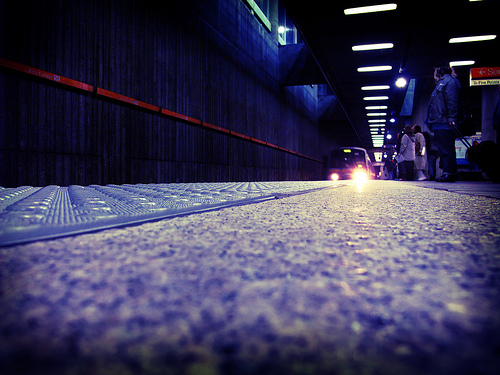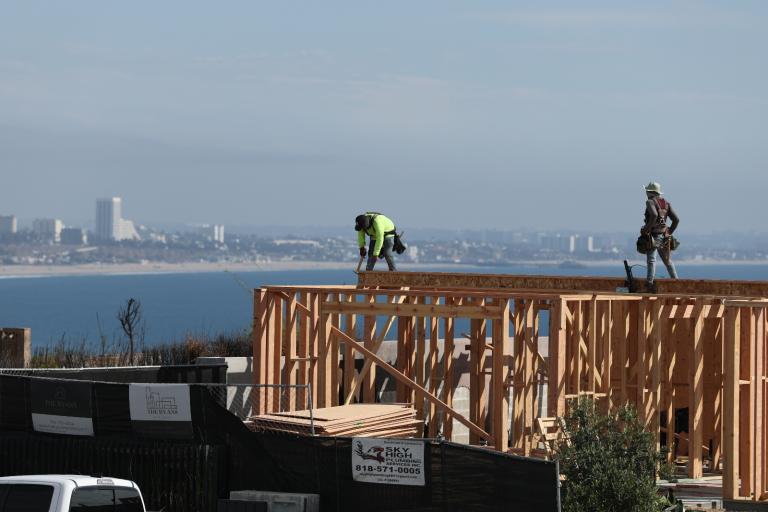
Photo by Charlie32480.
Here’s the $8.5 billion question: Can suburbanites be convinced to care about cities again?
Urban America is hoping so. For some cities, it’s a matter of life and death. And nowhere is the question more relevant than in Atlanta, where citizens will vote this summer on a massive regional transportation initiative that would stitch together a city and suburbs that have been divided for decades along racial, economic, and political lines.
The all-too-familiar storyline goes like this: Back in the 1960s and ’70s, Americans bolted from urban centers like concert goers from a burning theater, leaving cities smoldering, sometimes literally. And while urban industrial might built the suburbs, suburbanites were content to leave cities on the ash heap of history.
Witness the 1971 vote in Atlanta and its outlying counties over creating a tax to build a regional mass transit system. The vote broke down along racial lines, says Robert Bullard, a longtime Atlantan who is widely considered to be the father of environmental justice. The largely African American city and two counties voted to support the system, while two other counties, both predominantly white, opted out. The joke at the time was that MARTA — the Metropolitan Atlanta Rapid Transit Authority — was short for “Moving Africans Rapidly Through Atlanta.”
Atlanta built a bare-bones transit system, but while other metro areas, such as Washington, D.C., and Chicago, continued to build, MARTA, starved of state and regional money, slowed to a crawl. The system has since become something of a bad joke — and you don’t need to take my word for it. Just ask this guy, who says that when he was a newborn, his mother took him home from the hospital on MARTA. (Short version: “I fucking hate MARTA.” The long version is just pure awesome — and really crass.)
Still, despite its crappy transit system, Atlanta has turned around. The city lost population in the 1970s and ’80s, but has seen a resurgence in the last two decades, thanks in part to the 1996 summer Olympics. The racial divide has become less pronounced as well, as many blacks have moved to the suburbs, and whites, Asians, and Hispanics have moved into the city proper. Along with these changes comes a growing push to revitalize the urban core.
Enter Brian Leary, president and CEO of Atlanta Beltline Inc., who, along with a long list of urban boosters and activists, is pushing to create a 22-mile necklace of urban parks and light-rail lines atop an abandoned rail corridor encircling the heart of the city. The Atlanta Beltline has been called the country’s most ambitious smart growth project, and a string of parks and trails has begun to spring up. But completing the project will require money. An estimated $2.8 billion, to be specific.
And that’s where the $8.5 billion question comes in.
On July 31, voters in the Atlanta region will weigh in on a one-cent-on-the-dollar sales tax that would pour money into a host of transit projects designed to reduce congestion in the 10-county metro area. The Regional Transportation Referendum, as it is called, would raise $8.5 billion over 10 years, of which the Beltline would receive more than $600 million to build critical street car infrastructure. More money would go to MARTA, creating links between the urban core and suburbs to the east and west. (Also, a ton of cash will go to build and repair roads.) And this time, it’s all or nothing: Counties can’t opt out.
Not surprisingly, the initiative has gotten some pushback from the ’burbs. Several mayors of northern suburbs have expressed doubts about the wisdom of putting regional tax dollars into the Beltline in particular. “The Beltline is a very nice economic development program, but it is not a regional transportation initiative,” Sandy Springs Mayor Eva Galambos told Atlanta Progressive News last fall.
You can just hear the urbanists crying out in pain. If you want a good apple, you need a good core!
But suburbanites aren’t the only ones with reservations. Many Atlantans worry that the Beltline and other transit improvements will bring gentrification, pricing longtime locals out.
“To have people who promote the Beltline say, ‘Trust me, we’re going to do it right this time’ — I don’t see anything in past experiences that would somehow allow African Americans and people who are transit-dependent to say that we trust you to do the right thing this time,” says Bullard.
“If you look at the greening of Atlanta and infill development, you see that they’ve torn down public housing. Poor people have been shipped to the suburbs,” says Bullard, who is now dean of the school of public affairs at Texas Southern University in Houston. “You can’t have a new and improved Atlanta and have the first string suburbs becoming old Atlanta in terms of poverty, no grocery stores, no jobs.”
In other words, it’s nice that all you white folks suddenly think the city is the hip place to be, but don’t come stampeding back in here and push the black folks out to the new slums on the urban fringe.
Would Bullard vote for the Transportation Investment Act if he still lived in Atlanta? “I’d vote for it as long as we can address these legacy issues,” he says, “as long as we make sure that legacy drives the movement toward having public transportation being seamless and acceptable to all those who choose to use it.”
Leary, for his part, says Beltline supporters are trying to do just that. Atlanta Beltline Inc. and a coalition of groups recently created a community land trust designed to protect residents from gentrification. The nonprofit will work with neighborhoods where transit and parks will drive property values up, purchasing the land beneath people’s homes as a way of protecting them from rising property taxes. The landowners will maintain ownership over their homes, but the land trust will shoulder the rising tax burden.
Chicago has a similar land trust, but one has to think, given Atlanta’s history, that earning the trust of homeowners will be a trick.
With relations between different factions in and around Atlanta still shaky, can the transit initiative pass? Those who are involved say it is sure to be a close vote. One of the biggest challenges will be getting people out to the polls in the middle of summer — that is, convincing Atlantans, both urban and suburban, that thinking and working like a region even matters.




